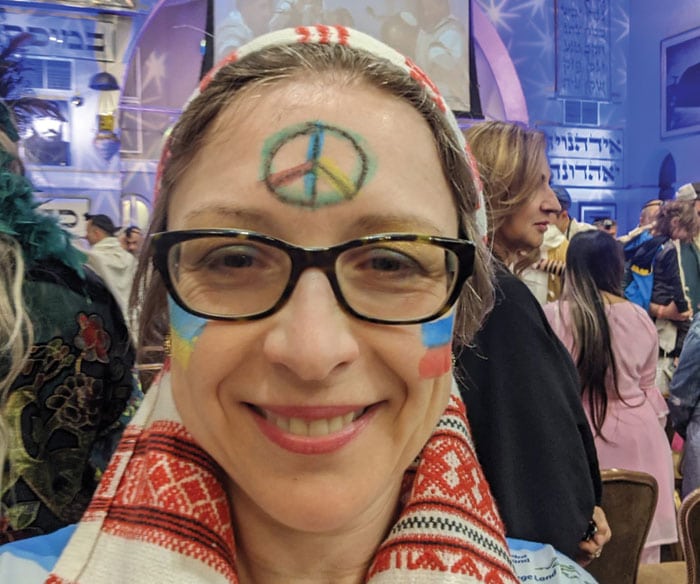
Ukraine-born Jewish business owner Yael Lichaa was dumbfounded when she learned that Russia had invaded her homeland.
“It didn’t make sense,” the owner of the Robertson Art Zone (RAZ) told the Journal. “[It’s] hard to believe. How could there be a war? We just came out from COVID. Seems to me people should appreciate life and their health now more than ever.”
Lichaa, who opened RAZ three years ago, believes “children will become enriched by exploring cultural art from around the globe, including Ukraine and Russia,” she said. “Each person has something unique to contribute to the world.”
Three weeks into the war, Lichaa painted both flags of Ukraine and Russia on her cheeks and placed a peace sign on her forehead. She wore a dress with the map of the world and a headdress of authentic weaving she brought from her native Ukraine.
Lichaa was 16 years old in 1990 when she, her brother, her dentist father and engineer mother fled their hometown of Kyiv for the United States during the reign of Mikhail Gorbachev.
“When my father (Lev Burda) came back from a visit to the U.S., he told our family, ‘We better get out right now,’” she said. With no regrets, the Burdas left.
Lichaa, especially, had no regrets. She had begun studying medicine and recalled a scene that has not faded from her memory. “When I was riding the bus [to class], I would see miserable people. Every day. It was very sad. Nobody ever smiled.”
While Gorbachev may be remembered as softer and more reasonable than his Soviet predecessors, Lichaa knew first-hand how difficult it was to be Jewish in that region.
“I did not know I was Jewish until I was 15,” she said.
Her mother, Zoya, was “ashamed” to be a Jew, and her father kept the secret. Her mother was annoyed when her grandparents spoke Yiddish. However, she recanted her rejection two years before she died, even accompanying her daughter to the Kabbalah Center.
When she was 48 years old, Lichaa began writing her autobiography. “Since I was a little girl, I dreamed about doing creative work,” she said. “Kindergarten and school were boring—too much talking, learning unnecessary topics and classes.”
After reading a biography of Marie Curie’s accomplishments as a young woman, she continued, “I wanted to do something that would find a cure for the world.” Working in a Philadelphia doctor’s office after her family settled there, Lichaa was disappointed to see the doctor give shots for the pain, rather than the cause.
She navigated from pre-med to the arts.
But one day, while Lichaa was working on a sculpture of a man, it hit her: Why create what already has been created?” she said. “I understood that it was tangible, easy to be destroyed. I wanted to build something that can stay in the world forever.”
Working on an art project in the early ‘90s, she came across a Tree of Life symbol rooted in Kabbalistic studies.
“After I screamed to God to help me find what it is I have to do [with my life], my best friend’s mother told me a Kabbalah center opened five minutes from my home.”
When Lichaa walked in, a lifetime commitment was formed. Today, she is a regular at the Kabbalah Center on Robertson Boulevard.
“[It’s] hard to believe. How could there be a war? We just came out from COVID.” – Yael Lichaa
None of that could have happened if her cousin Vika, 16, who had emigrated from Kyiv to New York in the 1970s, had not returned for a visit to Ukraine in 1989. Vika, who was writing a school paper on Lenin, asked if she could sit in on Lichaa’s class. Fearing that Lichaa’s cousin would be a negative political influence, the school refused to grant permission.
Walking home after school that day, a boy called out to Lichaa, “What are you doing here? Go to Israel!”
Lichaa was puzzled. “I had no friends there. Why should I go?” she said.
Since her parents never had disclosed their Jewishness, Lichaa knew nothing of Shabbat or Jewish holidays.
“That was the day I started asking questions,” she said. “What exactly does it mean to be Jewish? Why don’t people like Jews?”
Reflecting on her past, Lichaa said it’s easy “to appreciate the good times, but appreciating the hard times leads to spiritual growth and [the] manifestation of dreams.”























 More news and opinions than at a Shabbat dinner, right in your inbox.
More news and opinions than at a Shabbat dinner, right in your inbox.